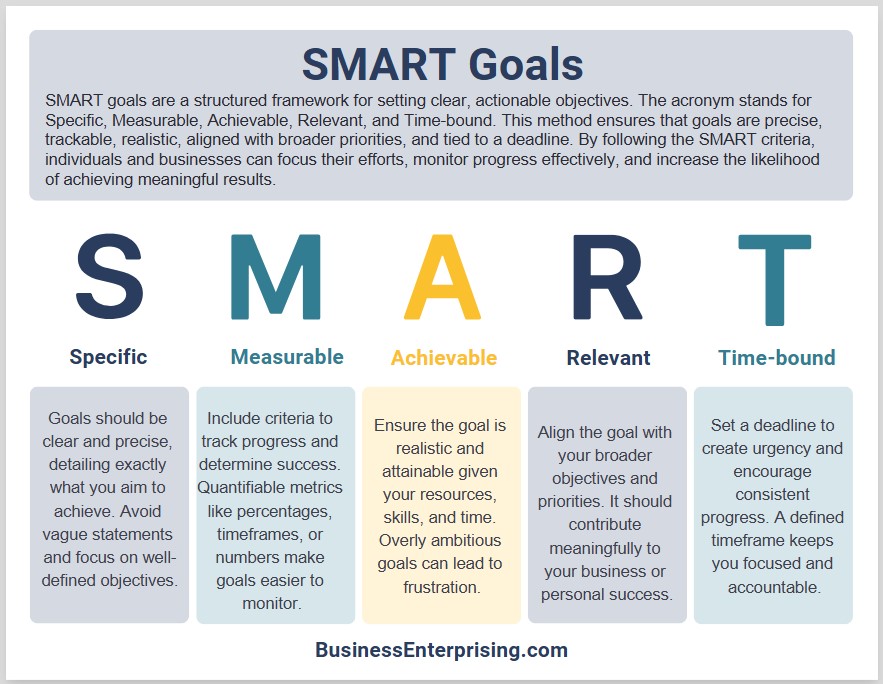
Business growth goals align your efforts with your overall vision, ensuring consistency across all strategies. Additionally, they allow you to measure progress and make necessary adjustments when circumstances change. Without clearly defined goals, your efforts may become scattered, which can make sustainable growth more difficult to achieve.
When you set realistic and actionable growth goals, you provide your team with a sense of purpose and shared commitment. Tracking progress toward these goals not only keeps everyone engaged but also maintains momentum. Overall, setting business growth goals establishes a strong foundation for success by helping you focus on what truly matters.
Understanding the Importance of Growth Goals
Setting business growth goals is essential for guiding your company toward long-term success. Clear goals provide a defined direction and purpose, helping you focus resources effectively. In addition, they allow you to measure progress and make informed decisions. Without specific objectives, your efforts may become scattered, which slows your growth.
Growth goals align with your overall strategy and vision by acting as a roadmap for the future. They help you prioritize activities that move your business forward while avoiding distractions. Moreover, by setting realistic and measurable goals, you can track progress and adjust your approach when needed. This alignment ensures that your daily operations consistently support your larger ambitions.
Communicating your growth goals to your team ensures that everyone works toward a shared purpose. This alignment fosters collaboration and boosts productivity. Additionally, setting business growth goals creates a structure for success, enabling you to anticipate challenges and seize opportunities. With the right goals, you can build a more focused and resilient business.
Defining SMART Growth Goals
Setting business growth goals using the SMART criteria helps you create clear, actionable objectives. SMART stands for Specific, Measurable, Achievable, Relevant, and Time-bound. Specific goals outline exactly what you aim to achieve, leaving no room for confusion. Measurable goals let you track progress and evaluate success effectively. By focusing on achievable goals, you balance ambition with realism, avoiding frustration from unattainable targets.
Relevant goals align with your business’s overall strategy and address your current needs. Time-bound goals include deadlines, creating urgency and motivating action. Together, these criteria ensure that your growth goals are both practical and actionable. SMART goals provide structure, allowing you to focus your efforts and allocate resources effectively.
Using SMART goals enhances the process of setting business growth goals by clarifying priorities and reducing guesswork. Additionally, clear objectives keep your team aligned and engaged, fostering accountability and collaboration. SMART goals also allow for flexibility, ensuring they remain useful as circumstances change. By adopting this method, you position your business for sustainable and measurable growth.
Identifying Key Metrics for Measuring Growth
When setting business growth goals, identifying the right metrics is essential for tracking progress and measuring success. Metrics like revenue, customer acquisition, or market share often reflect how effectively your business is growing. Choosing relevant metrics ensures that your goals align with the areas most critical to your business’s development. Consequently, focusing on these indicators helps you better understand what drives your growth.
Metrics vary depending on your industry and the stage of your business. For instance, a startup might prioritize customer acquisition or product adoption, while an established company may focus on market share or profitability. Considering your industry’s norms and your business’s current needs allows you to choose metrics that matter most. This targeted approach prevents you from wasting time on data that does not impact your goals.
Using relevant metrics enables you to make informed decisions and adjust your strategy as needed. Tracking these numbers consistently helps you evaluate what is working and identify areas for improvement. Setting business growth goals based on key metrics creates a clear pathway for achieving measurable results. With the right metrics in place, you can monitor your progress and stay on track toward sustainable growth.
Involving Your Team in Goal Setting
Involving your team in setting business growth goals promotes collaboration and helps create realistic objectives everyone can work toward. When employees contribute to goal-setting, they feel more invested in the process. This involvement encourages them to take ownership of their roles in achieving shared targets. Additionally, collaboration brings diverse perspectives, which can lead to more practical and well-rounded goals.
Motivating employees to align their efforts with business objectives starts with clear communication. When your team understands how their work impacts overall growth, they feel a sense of purpose. Moreover, regular discussions about progress and challenges help maintain focus and strengthen commitment. By recognizing individual and team contributions, you can boost morale and encourage ongoing effort.
Setting business growth goals with your team fosters a sense of unity and shared purpose. This approach builds trust and strengthens your company’s culture. With everyone working toward the same objectives, you can create a more cohesive and productive environment. Engaging your team in the goal-setting process ensures they remain motivated and aligned with your business’s success.
Adapting Goals to Market Conditions
Flexibility is essential when setting business growth goals, especially in a rapidly changing market. Market trends and customer demands can shift unexpectedly. If your goals don’t adapt, they may become irrelevant or harder to achieve. Therefore, staying flexible allows you to respond effectively and keep your business moving forward.
Revisiting your growth goals regularly helps you adjust to these changes. Start by analyzing how shifts in the market impact your priorities. Assess whether your current goals still align with these conditions or need updates. By doing this, you can redirect efforts toward areas with the most potential.
Revising your goals should involve your team and key stakeholders. Collaborative discussions provide valuable insights and foster alignment. Additionally, clear communication about changes helps everyone understand their role in achieving the updated objectives. Setting business growth goals that reflect the current market ensures your efforts remain focused and effective. Flexibility in goal-setting keeps your business resilient and better prepared for future challenges.
Tracking Progress and Celebrating Milestones
Regularly assessing progress is an important part of setting business growth goals. Regular reviews help you identify what is working and what needs adjustment. By tracking your progress, you can make informed decisions and allocate resources effectively. This ongoing evaluation ensures your goals remain realistic and aligned with current circumstances.
Celebrating milestones keeps your team motivated and focused on achieving the next objective. Recognizing accomplishments, no matter how small, boosts morale and reinforces the value of hard work. Sharing these successes with your team fosters a sense of pride and encourages continued effort. Additionally, milestones provide an opportunity to reflect on what contributed to the success, helping you replicate it in the future.
By combining regular progress tracking with meaningful celebrations, you maintain momentum toward your growth goals. This approach keeps your team engaged and ensures they feel valued for their contributions. Setting business growth goals is not just about achieving results but also about building a motivated and aligned team. Recognizing progress along the way strengthens your commitment to long-term success.
Conclusion
Setting business growth goals provides a clear roadmap for your company’s success. These goals help you focus resources and measure progress effectively. Additionally, by aligning them with your overall strategy, you ensure every effort contributes to meaningful growth. Flexibility in goal-setting allows you to adapt to changing market conditions, keeping your plans relevant and achievable.
Involving your team and celebrating milestones fosters a sense of collaboration and motivation. Regularly tracking progress helps you identify what is working and refine your approach as needed. These practices build a strong foundation for sustainable growth while keeping everyone aligned and engaged.
With the right strategies and consistent effort, setting business growth goals becomes a powerful tool for achieving long-term success. You create direction, maintain momentum, and inspire your team to contribute to shared objectives. This focused approach strengthens your business and positions it for future opportunities.



